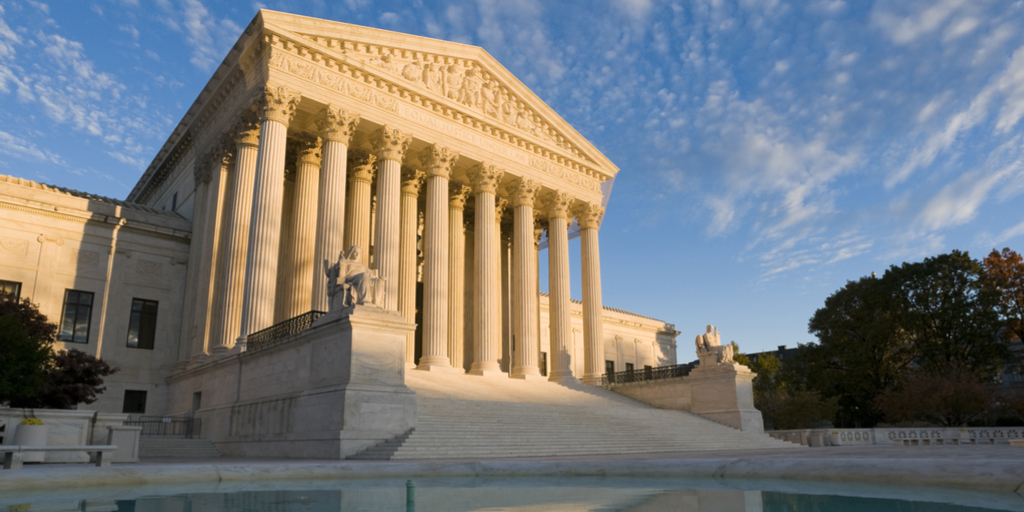The Supreme Court's Religion Problem
Our courts no longer know how to evaluate religious claims. Historically American law recognized that people do not merely have ideas about God, but rather belong to communities centered on beliefs, rituals, and standards of behavior rooted in a common understanding of the Divine. Unfortunately, courts today generally recognize only the demands of individual conscience rooted in nothing more than a romanticism of self-disclosure.
The Court’s recent decision in Masterpiece Cakeshop v. Colorado Civil Rights Commission provides a telling example. Religious groups soon determined that their supposed “win” at the hands of Justice Anthony Kennedy was so narrow as to be little more than a loss. The decision stands only for the “principle” that a government, motivated by anti-religious bias, may not punish a Christian baker for refusing to celebrate a same-sex union. Even if, in subsequent decisions, the Court more generally upholds individuals’ right not to be forced to express opinions that violate their conscience, the result is hardly encouraging for religious communities. Such a right is no small thing, and the alternative is truly frightening. But it offers no meaningful protection of religious freedom.
In this and two succeeding essays I forego close analysis of specific Supreme Court opinions. For too long legal commentators have wandered fecklessly in the weeds sprouting from an invasive and poisonous species, namely federal “religion clause jurisprudence.” This jurisprudence has been misconceived from the start. Courts and commentators have misconstrued the Constitution’s silence on religious matters for a commanding neutrality rather than its intended acquiescence to state control; they have misread the 14th Amendment as a means of imposing hostility from above in the name of an ideology of individualism foreign to our traditions and constitutional order.
It is time to leave off arguments over details and instead challenge presumptions. Here I argue that today’s courts ignore and/or reject fundamental truths regarding 1) human nature or who we are, 2) the social order or what is necessary for a decent society, and 3) the character and fundamental importance of America’s historically-grounded, common law.
In brief, first, persons are both social and religious by nature; their characters are formed, and they find meaning, in religious communities. Second, religious communities are where people develop the character and habits of association necessary to maintain ordered liberty; our constitutionalism rests on overlapping, self-governing communities—grounded in religion—that maintain order and virtue while limiting the reach of distant political rulers. Third, while it is wrong to assert that America is some sort of “Christian nation,” dedicated to furthering the cause of any specific religious institution or denomination, neither America nor its law is secular. Today’s courts seek to rewrite a Constitution and, especially, a common law deeply imbued with religious assumptions about the nature of justice and right conduct. The more courts succeed in excising religious assumptions from our law, the more our common culture decays, and the less able we are to maintain ordered liberty.
This first essay addresses the problem of human nature as misunderstood by today’s courts, and our elites more generally.
Even the most extreme secularist will claim that he respects the rights of “people of faith.” Such rhetorical gestures seem wise, given that over 90% of Americans believe in God in the sense of a higher power. Faith is an indispensable, inescapable aspect of human nature. All of us who engage in even minimal self-reflection are driven to find some explanation for our lives and deaths, some sense of meaning for our actions, our sins, and our sufferings. But one’s faith may be purely personal—a belief, whether about God, politics, or ice cream, is something one has. Meanwhile, religion (the Latin root means “to bind”) is a set of ordered beliefs and practices in which one engages as part of a group—a religion is a community in which one develops one’s character and personality. Courts today are willing to defend belief, but not religion.
Why? Principally because so many judges misunderstand and/or mistrust religion, even while acting on their own kind of faith. Our elites, and especially our legal elites, largely have set aside traditional religion themselves in favor of a common faith rooted in what Alexis de Tocqueville called “pantheism.” Pantheism is belief in the sacred nature of the universe as a whole, and of oneself as part of that universe. It lends itself to various ersatz religions, especially of the environmentalist variety, but also to the hyper-individualism so characteristic of modern culture. As Tocqueville noted, the problem with this faith is that it encompasses the whole and various individuals, but not the intermediary associations that form people’s character. In the end it is faith in ideology—in the state’s duty and power to create a more “just” society by regulating interpersonal relations as well as income distribution and life chances.
Pantheists—Progressives in common parlance—have little patience with substantive religion and the moral notion of liberty it supports. Such associations compete with the state for power and authority and aim at promoting personal and associational virtue rather than the Progressive brand of social justice—material security, equality, and individual autonomy. Progressives seek the kind of society Tocqueville warned American democracy might become—an undifferentiated mass of isolated and equal individuals, organized by a central government in the name of security and an unbounded, and ultimately illusory freedom, unencumbered by the institutions, beliefs, and practices encompassed in self-governing communities.
The most obvious legal examples of this ideology have been Justice Kennedy’s opinions in Planned Parenthood v. Casey (the infamous “mystery passage”) and again in Obergefell v. Hodges. These decisions raise individual autonomy and choice within a court-created zone of privacy above historically grounded definitions, norms, and practices, especially regarding marriage. Observers have argued that in these decisions the Supreme Court expanded individual rights and dignity. Yet Obergefell in particular rejects the rights of persons as members of groups and traditions to govern themselves in building and maintaining the most essential structures of their lives. The Court has reduced religion to individual faith. It has constructed a model of the person that is atomistic, shallow, and lacking in the essential attributes of full humanity. With this model as its guide it has endeavored to strip communities of their rights of self-government and even their reason to exist, all in the name of autonomy. As a result, individual persons are left increasingly weak and alone in the face of governmental power, even as this caustic individualism enervates the spiritual energy, the communal habits, norms, and influences, and the historical grounding necessary for ordered liberty and the rule of law.
Progressives are not wrong to see in religion a challenge to their program. Religion is deeper rooted than politics; allowed to flourish, it by nature guides and limits politics. As they say, politics is downstream from culture, and culture is by nature religious. The religious “cult” shares a Latin root with “culture” (and cultivate) because both relate to shared practices that shape people’s characters and their common ways of life. Most secular Americans think of religion as at best a weekly gathering of otherwise disconnected individuals and at worst an irrational mob wreaking havoc at the whim of some charismatic tyrant. Those who belong to strong religious communities know that they nourish true individuality through active participation in religious celebrations, schooling, social outreach, caring for the less fortunate, and the variety of less formal interactions that make up a way of life. These interactions breed associations and more formal institutions. They shape standards of conduct, art, and attitudes about everything from education to commerce to personal honor, forging specific cultures and civilizations.
American culture, as shown by countless colonial examples, recognized the importance of character formation within local associations, especially family, church, and township. This recognition was reflected in and reinforced by laws that upheld public religious celebrations and prayer, supported religious organizations and “public” schools rooted in religious understandings, and embodied, in local common law, overtly Christian conceptions of justice and morality. Numerous colonies had formal or informal religious establishments favoring one religious denomination above all others, though others favored only a generalized belief in God and commitment to Biblical norms. The federal Constitution was written so as not to interfere with these state arrangements, including by instituting any kind of national Church. This certainly made sense given the variety of denominations represented in the new nation and the understanding that communities are by nature relatively small and local. One powerful example of this tendency is John Adams’ Massachusetts Constitution, which both required public support for religion and ceded determination of the particulars to local communities.
Only in the New Deal era did the Supreme Court suddenly discover that centuries-long traditions of government aid to religious institutions and practices and public expressions of religious belief somehow violated the federal Constitution. In effect, as John Courtney Murray pointed out near the beginning of the Court’s usurpation of control over religion in America, the Court has taken the most radical, sectarian view of religion available, that of the young James Madison, and turned it into a false Constitutional holy writ. That sectarian view rests on the flawed assumption, found nowhere in our constitutional text, that it is possible to separate individuals’ “secular” from their religious purposes, effects, and motivations. It is a mechanistic view of human nature and an unreasonably confident view of the law’s capacity to make fine distinctions.
As sociologist Robert Nisbet pointed out, we are by nature communal animals. If we are denied healthy communities, we will have unhealthy ones. So also with religion. We will never escape the hold of religion. But if we neglect thinking about why religion is part of a healthy human life we will blind ourselves to the manifold ways that our need for religious meaning can take dangerous turns. By stifling religious communities, courts undermine the capacity of religious norms to house safely our natural drive for meaning. Torn from these traditional moorings, individuals’ passions attach to wild ideologies such as Marxism or fascism, and/or to dangerous charismatic leaders who will use the state to weaponize ersatz religion and ersatz community for their own ends, be they enervating, brutal or, most likely, both.

